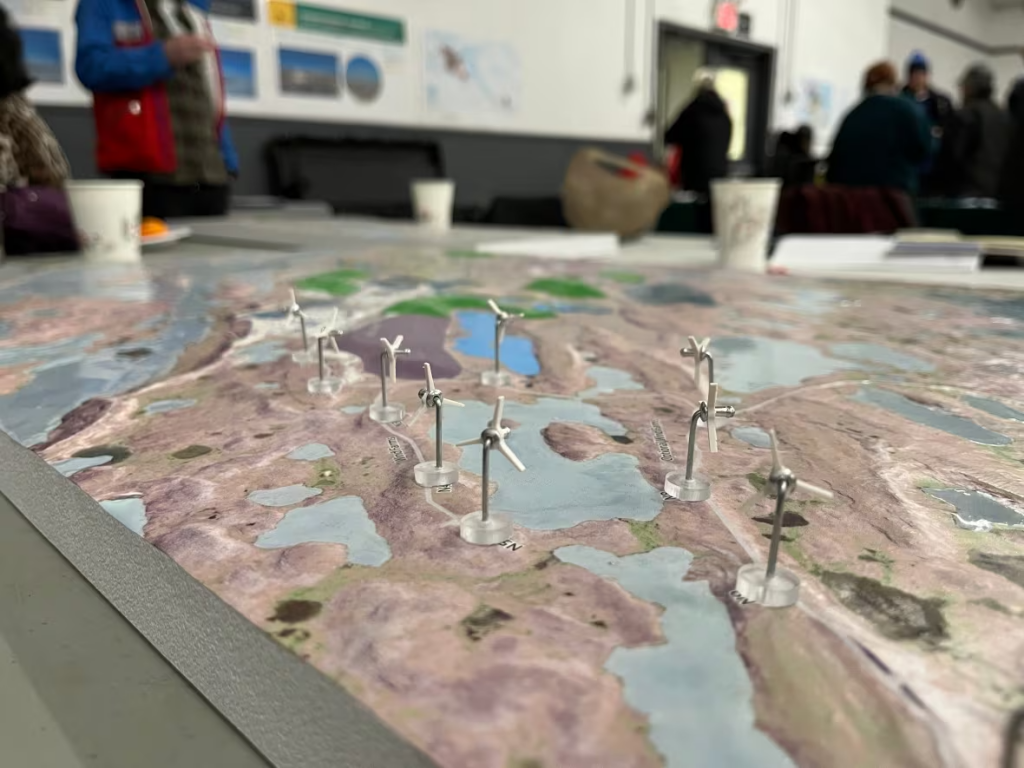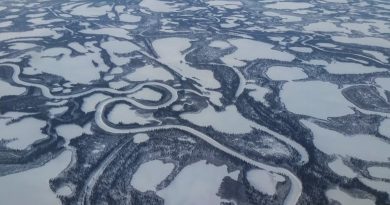Caribou concerns dominate hearing on Nunavut mine extension

· CBC News
‘The value of Qamanirjuaq herd to Kivalliq Inuit cannot be underestimated’: NTI
The first few days of a final public hearing on a Nunavut mine’s proposal to extend its project heard repeated concerns about how those changes would affect caribou.
The answer to those concerns, for the most part, is unknown. That’s because the project includes a proposal to create a wind farm to power the mine, the first of its kind in Nunavut.
Qamanirjuaq caribou in the Kivalliq, as hunters speaking at the hearing pointed out, have never encountered wind turbines.
Agnico Eagle’s Meliadine gold mine, which is about 25 kilometres north of Rankin Inlet, wants to build 11 wind turbines and extend the mine’s life until 2043.
The Nunavut Impact Review Board is in the midst of holding a final public hearing on the proposal, which includes technical meetings and a community roundtable, at the Singiituq Complex in Rankin Inlet this week.
Concerns over caribou migration
Noel Kaludjak, a representative from the Kangigliniq Hunters and Trappers Organization, said the HTO does not support the wind farm in its proposed location because it is too close to caribou calving grounds.
“Right now it seems like a great idea, but when reality hits, it will be a different story. It will affect migrating caribou herds and disrupt their natural habitat,” Kaludjak said.
Kaludjak said despite its opposition to the current proposal, the HTO supports creating an environmentally friendly power source for the mine.
For now, the HTO worries that a wind farm near the mine would disrupt caribou calving.

“In turn, it affects all of our main food source,” he said.
For its part, Agnico Eagle representatives said the mine would shut down the wind farm when 50 or more caribou are spotted within five kilometres of the site, a process that takes about a minute.
The mine also has several mitigation measures in place to protect caribou, including shutting down all surface work and the all-weather access road when caribou are spotted nearby.
Data presented by both Agnico Eagle and the Nunavut government at the hearing show caribou are clearly getting closer to the mine site.
Agnico Eagle data shows the mine was shut down because of caribou nearby 20 times so far in 2023, up from nine times in 2020. The all-weather access road has closed 26 times this year, up from 10 in 2020.
Dan Coulton, a wildlife biologist contracted by Agnico Eagle, said caribou are not reacting to mine-related activities and current mitigation measures are working.

Stephen Atkinson, a biologist contracted by the Nunavut government, presented an animation of caribou collared data near the mine from 2015 until 2023. The mine started operating in 2018.
The presentation showed that caribou have interacted more and more with the mine over the years. It also showed that collared caribou stopped crossing at a piece of land near Meladine referred to as “the narrows” after the mine was constructed.
Coulton said collar data is limited because it only paints a picture of 50 caribou out of a herd of 200,000. He also said an Agnico Eagle camera picked up caribou at the narrows this summer.
In its presentation, the Nunavut government also said it wants to see the threshold for shutting down the mine when caribou are nearby extended to 10 kilometres.
Kaludjak said the government’s presentation reflected what the HTO had observed.
“It shows that what we have been seeing is true,” Kaludjak said.

“I could feel the energy that we Inuit feel to see the animals’ ancient migration be disrupted,” he added after watching the presentation.
Gabriel Nirlungayuk, the director of wildlife with Nunavut Tunngavik Inc., agreed with the HTO.
“The value of Qamanirjuaq herd to Kivalliq Inuit cannot be underestimated,” Nirlungayuk said.
He also pointed out Rankin Inlet relies on the area of the proposed wind farm site to harvest caribou.
Guita Anawak, an elder from Rankin Inlet who sat through the hearing, said she doesn’t want the mine to develop further.
“I’m always concerned. This is my hometown,” Anawak said.

She also said that she’s worried about the future of the region she grew up in around Rankin Inlet because she has three grandchildren now who have become hunters.
“They should have a nice future to hunt, pick berries,” she said.
“It would be a scary sight for the caribou, never mind the sound, especially for calves,” she said of the wind farm.
Previously approved as an open pit operation, the current proposal also includes options for underground mining and is seeking approval to store tailings in open pits that are no longer being used.
The company also wants to improve access via the Tiriganiaq-Wolf portal to an underground mine that was already approved, along with infrastructure to support the Tiriganiaq-Wolf portal.
The hearing continues today and runs until Wednesday, when participants will make closing statements about the proposed project extension.
Related stories from around the North:
Canada: Mining company charged over exploration work near Whitehorse, CBC News
Russia: Mining comes to end in Nikel, Russia, The Independent Barents Observer
United States: Conservation groups sue government over Alaska mining road, The Associated Press


